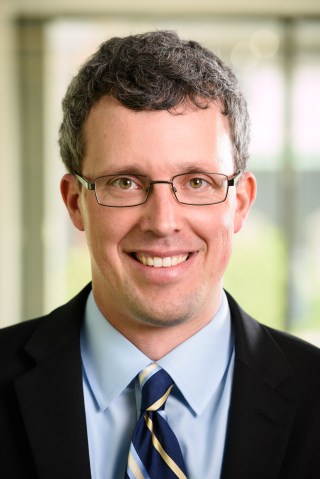About three-quarters or more of Americans are confident in the military, medical scientists and scientists in general to act in the best interests of the public. But fewer than half of Americans report similar confidence in the news media, business leaders and elected officials, according to a Pew Research Center report released earlier this month.
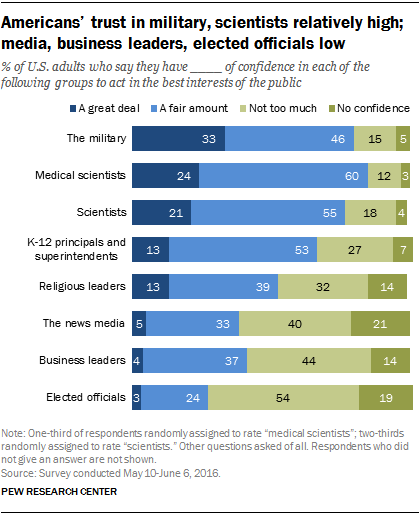
One-third of the public (33%) has a great deal of confidence in the military and an additional 46% say they have a fair amount of confidence. The high ranking of the military is consistent with a 2013 Pew Research Center survey, which found 78% of the public said the military contributes “a lot” to society.
Similar shares of Americans express at least a fair amount of confidence in medical scientists (84%) and scientists (76%).
The public expresses less confidence in school and religious leaders. About two-thirds (65%) say they have a great deal or fair amount of confidence in K-12 principals and superintendents and 53% have a great deal or fair amount of confidence in religious leaders.
Americans are least confident in the news media, business leaders and elected officials to act in the best interests of the public. Majorities have not too much or no confidence in each of these three groups, a pattern that is shared across the political spectrum. For example, majorities of both Democrats (68%) and Republicans (78%) say they have not too much or no confidence at all in elected officials to act in the best interests of the public, in keeping with previous Pew Research Center studies showing near-record low trust in the federal government.
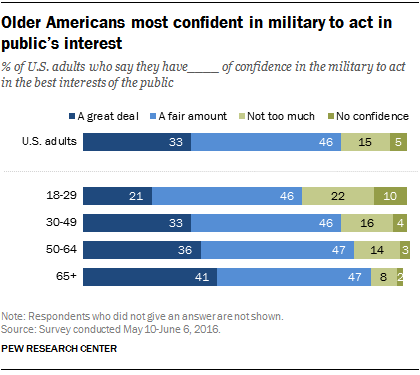
Majorities across major political and demographic groups express at least a fair amount of confidence in the military to act in the best interests of the public. Americans ages 65 and older are about twice as likely as those ages 18 to 29 to say they have a great deal of confidence in the military (41% versus 21%). Republicans and independents who lean to the Republican Party also have more confidence in the military than Democrats and Democratic leaners. Nearly nine-in-ten Republicans and Republican leaners (88%) say they have at least a fair amount of confidence in the military, compared with 73% of Democrats and Democratic leaners.
Majorities across social and demographic groups say they have at least a fair amount of confidence in scientists and medical scientists to act in the best interest of the public. Americans with more education are especially likely to say they have confidence in scientists. Among those with a postgraduate degree, 89% say they have a great deal or fair amount of confidence in scientists and 93% have a great deal or fair amount of confidence in medical scientists to act in the best interests of the public.
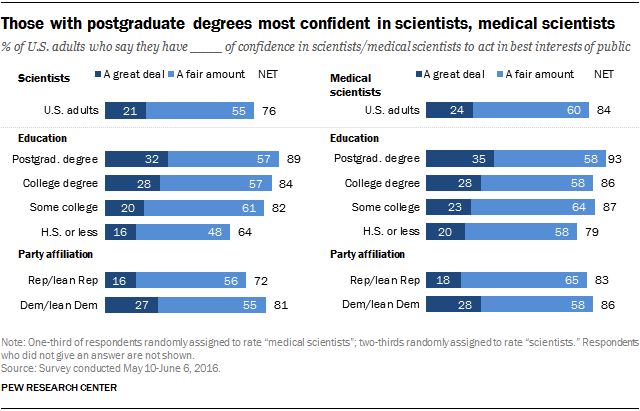
The Center’s survey found wide differences among political groups in views of climate scientists, but public confidence in scientists and medical scientists is roughly similar among Republicans and Democrats. Large majorities of both Democrats and Republicans have at least a fair amount of confidence in scientists and medical scientists to act in the public’s best interest.
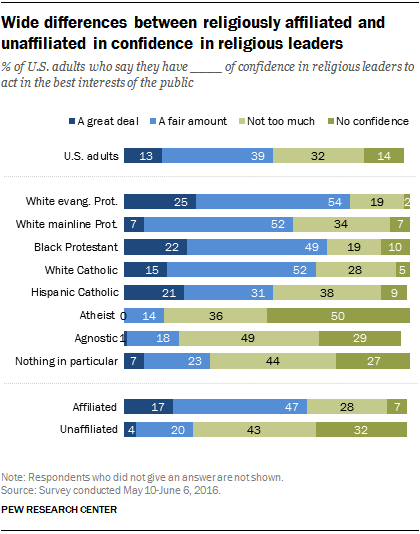
Confidence in religious leaders is closely tied to people’s own religious identity. A 64% majority of those affiliated with a religious group, whether Protestant, Catholic or some other religion, say they have at least a fair amount of confidence in religious leaders to act in the best interest of the public. White evangelical Protestants are particularly likely to say they are confident in religious leaders (78% have a great deal or fair amount of confidence).
In comparison, three-quarters of the religiously unaffiliated (75%) have not too much or no confidence in religious leaders to act in the best interests of the public. Fully half of atheists (50%) say they have no confidence in religious leaders to act in the public interest.
